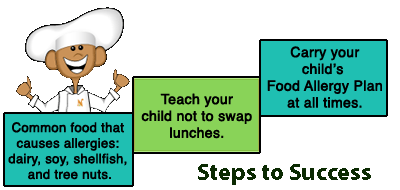Family's' Guide Managing Your Child's Food Allergic Reaction

According to a report by the Centers for Disease Control and Prevention(CDC) and Food Allergy and Anaphylaxis Network (FAAN):
- An estimated 3 million children have a food allergy
- One in every 17 children, under the age of three, has a food allergy
- Peanut allergy doubled in children over a five-year period (1997-2002)
- Even trace amounts of a food allergen can cause a reaction
How long will food allergies last?
There is some good news about food allergies. Children often outgrow the food allergy during early childhood.
It is estimated that 80% to 90% of egg, milk, wheat and soy allergies go away by the age of five years.

It is so important to avoid the food the child is allergic to (also called an allergen) and be able to recognize potential allergic reactions. Discuss with your pediatrician what is the food allergy action plan and ensure that all adults who are caring for your child have a copy of the action plan. If your doctor has prescribed epinephrine for your child, this medication can be life saving and must be available at all times.
Food can affect children in a surprising variety of ways. Your child can develop an allergy later in childhood even if he/she has never had one. Your pediatrician or allergist can perform tests to identify allergies as well as track your child’s food allergies and watch to see if they are going away.
- If you suspect your child is having a reaction, call your pediatrician right away.
- If your child appears to be in distress, call 911
- If you have to give your child epinephrine, call 911 immediately afterwards
Healthy Eating

Healthy Child

Written by Michelle Mirizzi
•
Written on Feb 14, 2012
•
Last updated on Oct 31, 2015



0 Comments